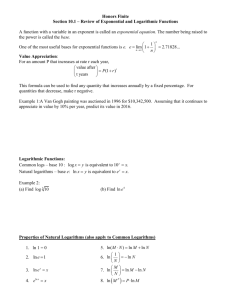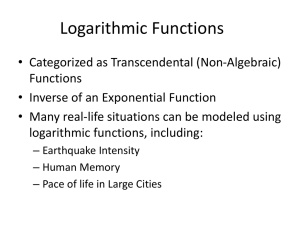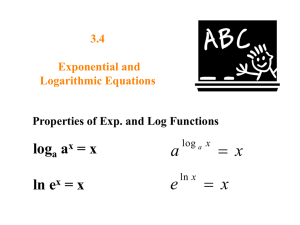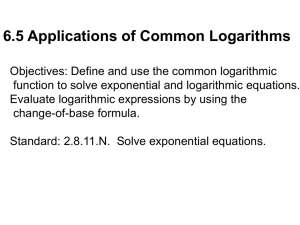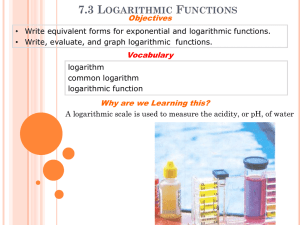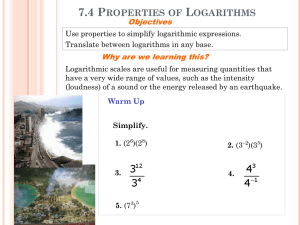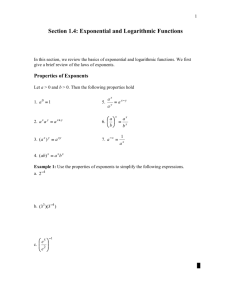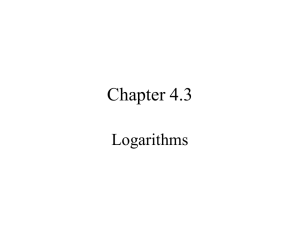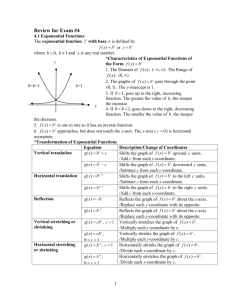Logarithm - The Ohio State University
advertisement
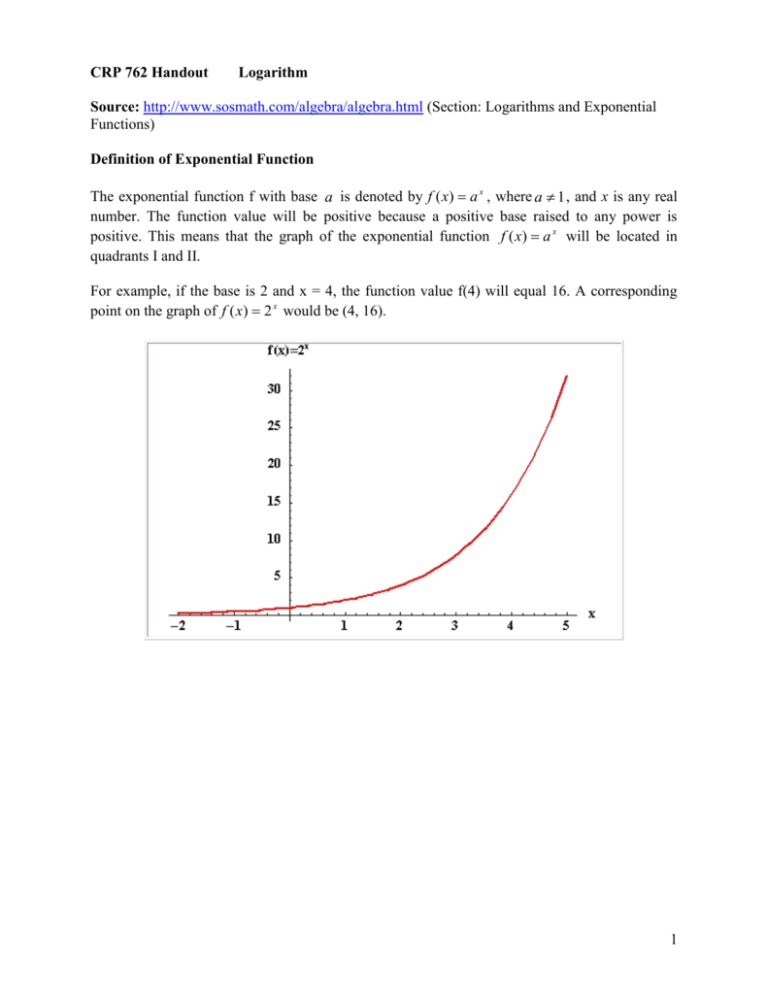
CRP 762 Handout Logarithm Source: http://www.sosmath.com/algebra/algebra.html (Section: Logarithms and Exponential Functions) Definition of Exponential Function The exponential function f with base a is denoted by f ( x) a x , where a 1 , and x is any real number. The function value will be positive because a positive base raised to any power is positive. This means that the graph of the exponential function f ( x) a x will be located in quadrants I and II. For example, if the base is 2 and x = 4, the function value f(4) will equal 16. A corresponding point on the graph of f ( x) 2 x would be (4, 16). 1 Definition of Logarithmic Function For x >0, a>0 , and a 1 , we have Since x > 0, the graph of the above function will be in quadrants I and IV. Comments on Logarithmic Functions The exponential equation 4 3 64 could be written in terms of a logarithmic equation as log 4 (64) 3 . 1 The exponential equation 5 2 can be written as the logarithmic equation 25 1 log 5 ( ) 2 . 25 Since logarithms are nothing more than exponents, you can use the rules of exponents with logarithms. Logarithmic functions are the inverse of exponential functions. For example if (4, 16) is a point on the graph of an exponential function, then (16, 4) would be the corresponding point on the graph of the inverse logarithmic function. 2 The two most common logarithms are called common logarithms and natural logarithms. Common logarithms have a base of 10, and natural logarithms have a base of e. On your calculator, the base 10 logarithm is noted by log, and the base e logarithm is noted by ln. 3 Properties of Logarithms Property 1: log a 1 0 because . Example 1: In the equation 14 0 1 , the base is 14 and the exponent is 0. Remember that a logarithm is an exponent, and the corresponding logarithmic equation is log 14 1 0 where the 0 is the exponent. 1 1 Example 2: In the equation ( ) 0 1 , the base is and the exponent is 0. Remember that 2 2 a logarithm is an exponent, and the corresponding logarithmic equation is log 1 1 0 . 2 Example 3: Use the exponential equation x 0 1 to write a logarithmic equation. The base x is greater than 0 and the exponent is 0. The corresponding logarithmic equation is log x 1 0 . Property 2: log a a 1 because . Example 4: In the equation 31 3 , the base is 3, the exponent is 1, and the answer is 3. Remember that a logarithm is an exponent, and the corresponding logarithmic equation is log 3 3 1 . Example 5: In the equation 871 87 , the base is 87, the exponent is 1, and the answer is 87. Remember that a logarithm is an exponent, and the corresponding logarithmic equation is log 87 87 1 . Example 6: Use the exponential equation p1 p to write a logarithmic equation. If the base p is greater than 0, then log p p 1 . Property 3: log a a x x because a x a x . Example 7: Since you know that 3 4 3 4 , you can write the logarithmic equation with base 3 as log 3 3 4 4 . Example 8: Since you know that 13 4 13 4 , you can write the logarithmic equation with base 13 as log 13 13 4 4 . Example 9: Use the exponential equation 4 2 16 to write a logarithmic equation with base 4. You can convert the exponential equation 4 2 16 to the logarithmic equation log 4 16 2 . Since the 16 can be written as 4 2 , the equation log 4 16 2 can be written log 4 4 2 2 . 4 Rules of Logarithms Let a be a positive number such that a does not equal 1, let n be a real number, and let u and v be positive real numbers. Logarithmic Rule 1: Log a (uv) Log a (u) Log a (v) u Logarithmic Rule 2: Log a ( ) Log a (u ) Log a (v) v Logarithmic Rule 3: Log a (u ) n nLog a (u ) Since logarithms are nothing more than exponents, these rules come from the rules of exponents. Let a be greater than 0 and not equal to 1, and let n and m be real numbers. Exponential Rule 1: a n a m a n m Example: Let a = 5, n = 2, and m = 6. 5 2 * 5 6 25 *15625 390625 and 5 26 58 390625 an Exponential Rule 2: m a n m a Example: Let a = 5, n = 2, and m = 6. 52 25 0.0016 and 5 26 5 4 0.0016 6 15625 5 Exponential Rule 3: (a n ) m a nm Example: Let a = 5, n = 2, and m = 6. (5 2 ) 6 (25) 6 244140625 and (5) 2*6 (5)12 244140625 5 Note: The above information is from http://www.sosmath.com/. This is good website for a quick catch of the Math you have forgotten. It has lots of examples. The only thing I don’t like about this website is that when you open it, it has some pop-ads. Here you can select the section you want. Algebra and Matrix Algebra may be the materials we need in our class. 6
